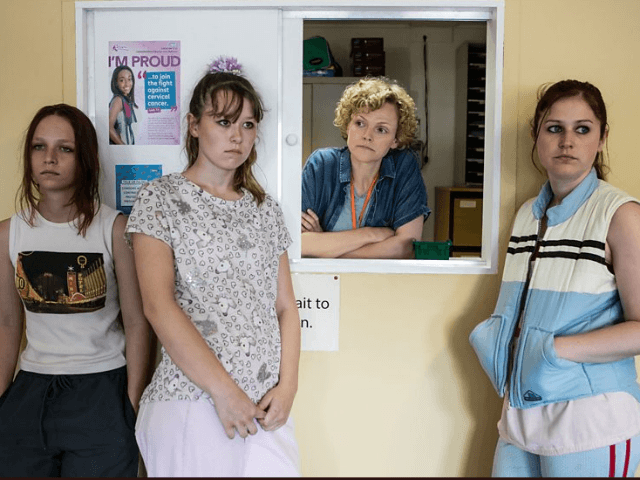The first episode of the BBC’s drama on Muslim rape gangs in Rochdale, Three Girls, has been broadcast to widespread critical acclaim in the mainstream media. References to key themes in the case identified during the subsequent investigation such as the role of religion were so far notably absent, however.
One of three parts, the programme follows the true story of Holly (not real name), 15, who is new to the town, as she gets dragged into a cycle of violence and abuse.
The episode does not shy away from portraying the groomers as violent, brutal rapists. Yet, it focuses on the failings and indifference of the police and social services, rather than exploring certain tenants of Islamic doctrine that can be interpreted as sanctioning such treatment of non-Muslim women.
The BBC programme documentary makers behind the show have already been on record as saying they “didn’t want to give these people [the English Defence League] an opportunity” by making the series, and that “there was no religious basis for this”.
Following episodes may explore this in more detail, but at this stage, there has been no examination of one-half of the story – namely, what was going on within Rochdale’s Islamic community that allowed well-known family men to effectively hold hostage 47 young white girls in the town over the course of a decade.
When the case finally came to court, Judge Gerald Clifton made clear the facts of the matter were not aligned with what has become the BBC’s take on the religious issue, clearly stating it was a factor in the case and part of what motivated the men to treat the girls as they did.
He said the men treated the girls “as though they were worthless and beyond respect”.
“One of the factors leading to that was the fact that they were not part of your community or religion.”
Describing the episode, the BBC writes: “New to the area, Holly is keen to make friends but finds herself drawn into a frightening world she is unable to escape – a world all too familiar to sexual health worker Sara [real name]. As her relationship with her family fractures, Holly finds the courage to speak out, but will her nightmare finally end?”
It is told through the eyes of the victims. Early on in the show, they meet the group of older Muslim men, who give them free food, alcohol, and cigarettes, before demanding sex in squalid rooms above a kebab house.
“When you gunna have sex with me?… I buy you things and you give me things”, abuser Billy says to Holly, after cornering her upstairs. After raping the girl, he stuffs a £10 note into her hand, and adds: “Look: you’re my bitch now, and if you cross me, I kill ya.”
The scenes are said to be based on extensive interviews with the victims. One of them, with learning difficulties, boasts to Sara of being “famous in Pakistan” after being filmed naked by her abuser.
Unlike the other girls, however, Holly recognises that she has been raped. She reports it to the police but is charged with vandalising the kebab shop. She later retracts her report when Billy threatens to kill her and her friends, as well as rape her little sisters.
By the end of the episode, Holly and her friends have been trafficked to Bradford and raped by multiple men. Holly falls pregnant, and when a social worker investigates, she tells Holly’s parents she is a prostitute.
“Me and you are looking at the same thing,” Sara shouts at the social worker later. “But where I’m seeing kids being turned inside out by abusers, all you lot are seeing are slags who bring it on themselves.”

COMMENTS
Please let us know if you're having issues with commenting.